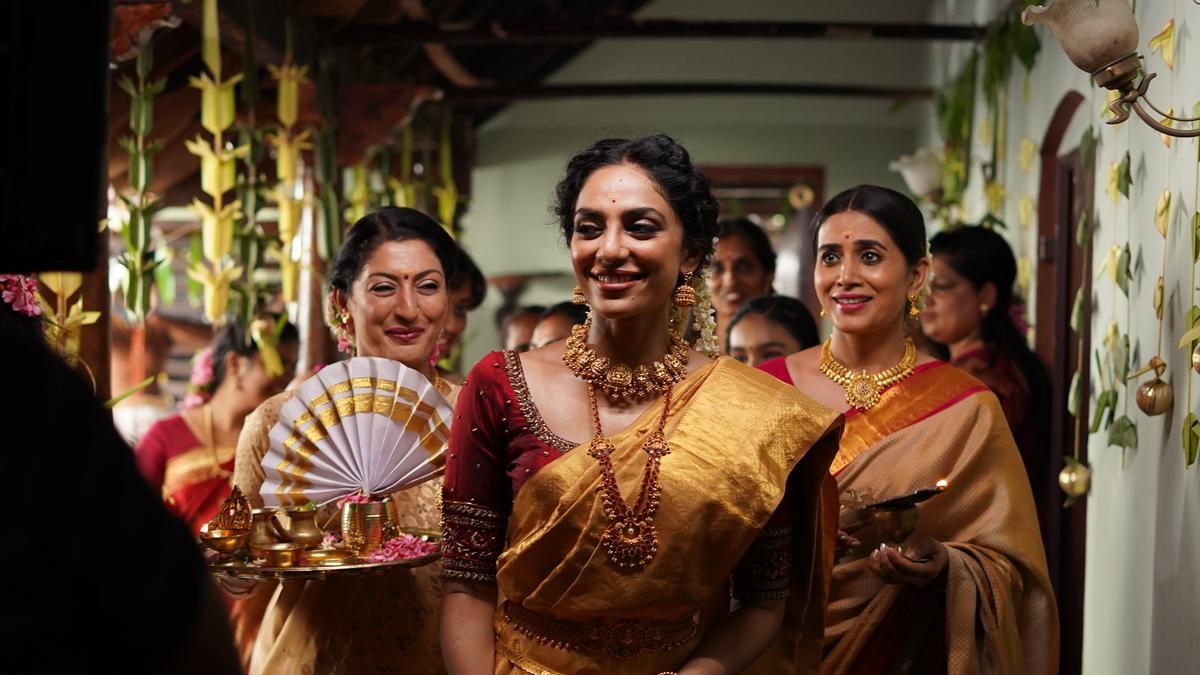
“Love, Sitara” opens with an evocative nod to the classic line from Leo Tolstoy’s Anna Karenina, highlighting the universal dichotomy between happy and unhappy families. The movie features Sitara, affectionately known as Tara, played by the talented Sobhita Dhulipala, immediately setting the stage for a nuanced exploration of familial and romantic relationships. Unlike Tolstoy’s epic, the dialogue in Vandana Kataria’s film strives for philosophical musings but often results in catchy self-help slogans.
The storyline revolves around Tara and Arjun, portrayed by Rajeev Siddhartha. They are both successful professionals—Tara is a renowned interior designer while Arjun is making waves as a chef, recently securing an opportunity in Singapore. However, their lengthy, tumultuous relationship takes an unexpected turn when Tara discovers she’s pregnant—a revelation she strategically withholds from Arjun while simultaneously proposing marriage. The pregnancy drives Tara’s reluctant shift towards matrimony, but the underlying motivations and emotions propelling this decision are kept deliberately murky.
As family members from both sides gather in Kerala, the setting is primed for interpersonal drama amidst traditional rituals and cultural festivities. However, this seemingly joyous occasion begins to crack as secrets and lies start to surface, including deep troubles in her parents’ marriage. These revelations push Tara into an emotional quagmire, reminiscent of her character in the Amazon series “Made in Heaven,” where she plays a wedding planner uncovering the hidden truths of others.
Director Vandana Kataria has a background as an acclaimed production designer, and she made her directorial debut with 2019’s “Noblemen,” which dealt compellingly with themes of bullying and toxic masculinity. Her switch to focusing on the female experience in “Love, Sitara,” involves strong performances from actors like Sonali Kulkarni and veteran theatre actress B. Jayashree, who plays Tara’s affectionate but quirky Amumma. Yet, the new film doesn’t delve as deeply into psychological complexities as Kataria’s previous work.
The main stumbling block is the writing.
. The dialogue oscillates unnaturally between English and Hindi with occasional Malayalam phrases, failing to achieve a coherent linguistic flow. The familial interactions, filled with artificially poignant repartees such as “A mistake can wreck a thousand lives” and “hearts, like monuments, should be built of stone,” feel stilted rather than genuinely spontaneous. The climax of the movie lapses into melodrama, accentuated by dramatic weather changes and exaggerated emotional outbursts reminiscent of a television soap opera.
Despite being set in picturesque Kerala, the film doesn’t effectively utilize this vibrant locale, and some character portrayals risk descending into stereotypes, such as the chatty housemaid burdened with an alcoholic spouse.
However, the gem of the film lies in a crucial argument scene between Tara and Arjun. This moment brings authenticity and grounding, showcasing a couple with a complex shared history rather than mere plot devices. If not for the shadow of Dhulipala’s other similarly named character, Tara Khanna from “Made in Heaven,” her performance might stand out more distinctly. Ikhlaque Khan’s portrayal of Arjun’s father, a retired army man filled with patriotic fervor, also deserves commendation for adding gravitas and subtlety to the narrative.
One of the standout characters in the movie is Tara’s best friend, Anjali, played by Tamara D’Souza. She is an award-winning photojournalist working on human rights issues, who conveniently turns her professional skills towards capturing the pre-wedding festivities with her camera. Her character adds an interesting dimension and a bit of levity to an otherwise heavy plot.
“Love, Sitara” ultimately stands as a mixed bag. While it aims to depict genuine emotional messiness, it does so with a certain reticence that might leave viewers yearning for a deeper dive into its characters’ psyches. Currently streaming on ZEE5, “Love, Sitara” offers an intriguing watch, especially for those interested in the juxtaposition of personal and societal expectations in contemporary Indian culture. Despite its imperfections, it opens up dialogues about truth, deception, and the complexities of relationships, making it a notable effort in the realm of modern Hindi cinema.












